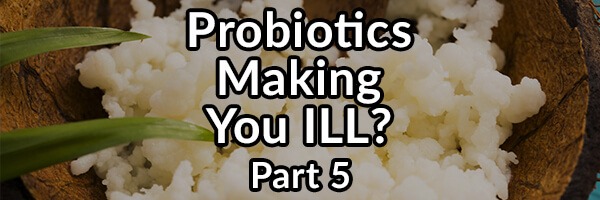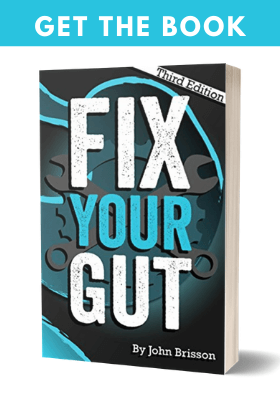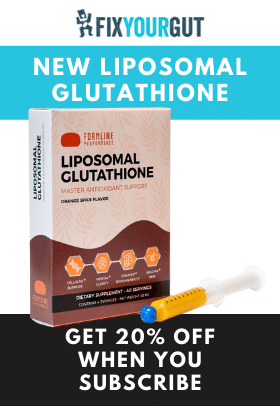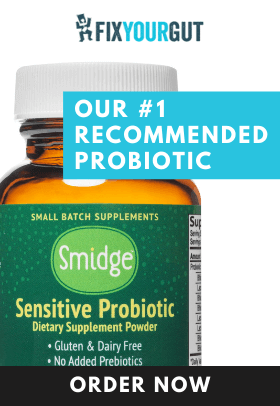Every wonder why some people react positively to probiotics and some people feel horrible? Histamine reactions occur more frequently in some people that take probiotic supplements causing issues. Inflammation and strong herx reactions occur in some people that take probiotics, causing them to feel worse. I thought probiotic supplements were supposed to improve the digestive health of everyone that takes them. What if certain stains modulate the immune system so that some people feel ill when taking them and other people thrive on the very same supplement or strain.
Probiotics, Th1 / Th2 Reactions, and our Immune System
More research is needed to determine exactly how probiotics modulate our immune system. We barely have an understanding how pathogens affect our immune system and most of what conventional medicine believes is incorrect. Cytokines are proteins that our cells secrete to signal immune reactions. Cytokine release regulates inflammation, histamine production, gene expression, and identification / elimination of pathogens by our immune system. One of the major releases of cytokines by our immune system occurs from our helper T cells. 1 2 3 4 5 6 7
We are briefly going to talk about the Th1 and Th2 divisions of helper T Cells and how they relate to your state of health.
Th1 – Th1 cells are what is known as cell-mediated immunity and help us fight off Gram-negative bacteria, mycobacteria, and viruses. When our body comes into contact with these organisms or has a chronic infection or overgrowth of them, the Th1 cells of our immune system become active. Inflammation occurs, and certain cytokines are released to try to help deal with the infection, TNF-a, IFNy, and IL-2. In chronic infections or overgrowth, our Th1 cells remain overactive and cause dominance in our immune system. Certain symptoms occur including, inflammation and brain fog after ingesting food (usually after a few hours), brain fog, fatigue (sometimes after meals and from exposure to sunlight), SIBO, IBS, joint pain, inflammation, hypothyroidism (low T3), rosacea, reduction in frequency of colds and infections, and ulcers. There are “autoimmune diseases” that are linked to Th1 dominance; I will go into more on that in a later post about helper T cells, but here is some more information. 8 9 10 11 12 13 14
Th2 – Th2 cells are what is known as antibody-mediated immunity and help us fight off Gram-positive bacteria, H. pylori, yeast, mycotoxins, mycobacteria, and parasites. When our body comes into contact with these organisms or has a chronic infection or overgrowth of them, the Th2 cells of our immune system become active. Histamine reactions and inflammation occurs. Certain cytokines are released to try to help deal with the infection, IL-4, IL-5, IL-6, IL-10, IL-13. In chronic infections or overgrowth, our Th1 cells remain overactive and cause dominance in our immune system. Certain symptoms occur including, inflammation, histamine intolerance, asthma, allergies, anaphylaxis, hives, post nasal drip, GERD, multiple chemical sensitivity, low pregnenolone, and ulcers. There are “autoimmune diseases” that are linked to Th2 dominance; I will go into more on that in a later post about helper T cells, but here is some more information. 15 16 17 18 19 20 21 22 23
There is a test that can be done to determine if you are Th1 / Th2 dominant by measuring certain cytokines.
What Probiotics Stimulate Which Th Response
Certain probiotics increase or decrease Th1 or Th2 responses by our immune system. If you are Th1 dominant for example, you would not want to take probiotics that increase Th1 responses it can increase inflammation and symptoms. You instead would want to take probiotics that lower Th1 and maybe probiotics that lower Th1 and increase Th2 to balance your immune system.
Probiotic Strains That are Believed to Manipulate Th1 24
TNF-a
Increases
- L. bulgaricus
- L. casei Shirota
- L. plantarum
- L. reuteri
- L. rhamnosus
- L. salivarius
- B. bifidum
- E. coli (TG1)
- L. acidophilus
- L. casei Shirota
- L. johnsonii
- L. paracasei
- L. plantarum
- L. reuteri
- L. rhamnosus GG
- L. salivarius
- Bifidobacteria
- L. casei
- L. lactis
- L. gasseri
- L. paracasei
- L. plantarum
- L. reuteri
- L. rhamnosus GG
- L. salivarius
- B. lactis
- L. bulgaricus
- L. casei Shirota
- L. helveticus R389
- L. rhamnosus
- Bifidobacteria
- L. acidophilus
- L. casei
- L. delbrueckii subsp. bulgaricus
- L. helveticus R389
- L. rhamnosus
- S. thermophilus
- Why Supplementing With Probiotics May Make You Ill – Part 1: Excessive Histamine Production
- Why Supplementing With Probiotics May Make You Ill – Part 2: MMC Issues
- Why Supplementing With Probiotics May Make You Ill – Part 3: Mislabeling
- Why Supplementing With Probiotics May Make You Ill – Part 4: D-lactate
- Why Supplementing With Probiotics May Make You Ill – Part 5: Th1 / Th2 Immune Reactions
- http://www.ncbi.nlm.nih.gov/pmc/articles/PMC3388628/ ↩
- http://www.ncbi.nlm.nih.gov/pmc/articles/PMC27457/ ↩
- http://www.ncbi.nlm.nih.gov/pubmed/12946237 ↩
- http://www.ncbi.nlm.nih.gov/pubmed/14739648 ↩
- http://www.altmedrev.com/publications/8/3/223.pdf ↩
- https://selfhacked.com/2014/06/16/supplements-foods-exercise-right-type-th1-vs-th2-dominance/ ↩
- http://hypothyroidmom.com/autoimmune-patients-have-you-heard-of-th1-and-th2-dominance/ ↩
- http://www.ncbi.nlm.nih.gov/pmc/articles/PMC3388628/ ↩
- http://www.ncbi.nlm.nih.gov/pmc/articles/PMC27457/ ↩
- http://www.ncbi.nlm.nih.gov/pubmed/12946237 ↩
- http://www.ncbi.nlm.nih.gov/pubmed/14739648 ↩
- http://www.altmedrev.com/publications/8/3/223.pdf ↩
- https://selfhacked.com/2014/06/16/supplements-foods-exercise-right-type-th1-vs-th2-dominance/ ↩
- http://hypothyroidmom.com/autoimmune-patients-have-you-heard-of-th1-and-th2-dominance/ ↩
- http://www.ncbi.nlm.nih.gov/pmc/articles/PMC3388628/ ↩
- http://www.ncbi.nlm.nih.gov/pmc/articles/PMC27457/ ↩
- http://www.ncbi.nlm.nih.gov/pubmed/12946237 ↩
- http://www.ncbi.nlm.nih.gov/pubmed/14739648 ↩
- http://www.altmedrev.com/publications/8/3/223.pdf ↩
- https://selfhacked.com/2014/06/16/supplements-foods-exercise-right-type-th1-vs-th2-dominance/ ↩
- http://hypothyroidmom.com/autoimmune-patients-have-you-heard-of-th1-and-th2-dominance/ ↩
- http://www.ncbi.nlm.nih.gov/pubmed/19592695 ↩
- http://www.hindawi.com/journals/jir/2015/981328/ ↩
- http://www.ncbi.nlm.nih.gov/pmc/articles/PMC3388628/ ↩
- http://www.ncbi.nlm.nih.gov/pmc/articles/PMC3388628/ ↩
Decreases
Bifidobacterium breve
IFN-y / IL-12
Increases
Probiotic strains that may help people with Th1 issues, Bifidobacterium breve, L. delbrueckii subsp. bulgaricus, L. helveticus R389, S. thermophilus.
Probiotic Strains That are Believed to Manipulate Th2 25
IL-4 / IL-5
Decreases
IL-6
Increases
IL-10
Some of these probiotic strains would lower TNF-a by increasing IL-10. If you notice, some are noted to increase TNF-a, which might cause a net equalizing effect. If you have an elevated TNF-a gut condition like ulcerative colitis or Crohn’s disease it might be worth trying these probiotic bacteria to see if it improves your condition even if it is known to increase TNF-a.
Increases
Probiotic strains that may help people with Th2 issues, Bifidobacterium (may increase IL-10 in some people which may cause Th-2 issues, avoid B. lactis), L. lactis, L. gasseri, L. paracasei, L. plantarum, L. reuteri, L. rhamnosus, L. salivarius.
See more from this series:







Is there a specific probiotic for overactive TH2 and under active TH1?
Cheers.
You would have to use the individual strains listed to reduce Th2. Custom probiotics sells individual strains.
You literally repeated your sources again and again. Why did you do that? And I could not verify your sources. For example, you claim that L. plantarum increases IFN-y…yet your citation does not even mention that.
Everytime I read about something about th1/th2 responses, I read something else saying the opposite. Very frustrating. Here is a link that seems to contradict B Brevia being good for th1 situations. https://www.ncbi.nlm.nih.gov/pmc/articles/PMC3178565/ It seems as though Brevia is good at raising TNF-a. Probably not good for many with autoimmune diseases. Please let me know if I’m off base.
Sorry about mispelling B Breve
You are somewhat correct, some individual strains of Breve would. It is all very complex!
Everytime I read about something about th1/th2 responses, I read something else saying the opposite. Very frustrating.
Great article! I will send it to my friend with Collitis. What test is recommended to determine Th1 and Th2 levels?
https://www.truehealthlabs.com/TH1-TH2-Balance-Panel-Basic-p/lc_815250.htm
Is there a brand of probiotic that you would recommend for decreasing TH-1?
I have an overlapping here of symptoms .
my symptoms are intolerant to light on eyes and skin
nerve pain teeth
ga when i eat anything
amlnourished
GErd
Nasal drip
obviously something is going on that is causing all this
What about S. boullardi ?
Mixed information on if you should take a Sibo safe probiotic like Lactoprime plus with post infectious Sibo-C at all or spaced apart from Xifaxan and herbals . This is a confusing subject , what is your opinion ?
For some it may help for others it could worsen inflammation and their issues. It depends on the individual person.
I have massive problems with diaharrea and immune problems everything i eat goes through me…i dont know what to do ?
https://fixyourgut.com/treatment-of-gerd-protocol-1-sibo/, https://fixyourgut.com/campylobacter-a-cause-of-sibo/
Hi. How do you subscribe to your blog?
Hi,
Good article. Do you know good specific supplements with these probiotic strains? Thank you!